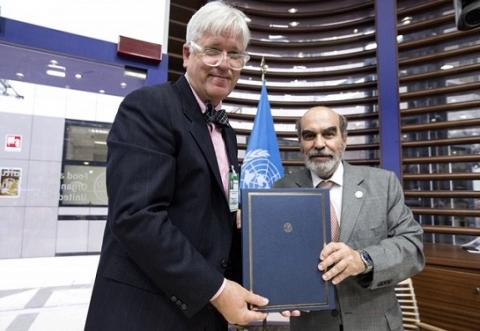Resnick Center Partners with UN on Global Food Initiatives

The Resnick Center for Food Law and Policy at UCLA School of Law has entered into a partnership with the United Nations Food and Agriculture Organization (FAO) on a series of research and advisory initiatives to confront global food security, nutrition, safety and quality.
The parties signed a memorandum of understanding at an FAO event in Rome on June 10, where leaders in global food policy gathered for a series of talks on the future of food. Michael Roberts, executive director of the Resnick Center, attended and served as a featured participant in a roundtable discussion on academic perspectives of global nutrition policy.
The agreement establishes a working relationship between the Resnick Center and the UN, including an initial project involving food fraud that builds on recent research by UCLA Law scholars. Hilal Elver S.J.D. '09, who serves as the Resnick Center's global distinguished fellow and the UN's Special Rapporteur on the Right to Food, was instrumental in building the partnership between the center and the FAO.
“FAO is glad to partner with UCLA, one of the most prestigious academic institutions around the world,” FAO director-general José Graziano da Silva said in a statement. “Promoting healthy food systems has become a top priority [in] sustainable development, and this cannot be done with [inadequate] regulation. … UCLA law school expertise, in particular on food law, will surely contribute to address this key challenge.”
The collaboration continues the close relationship between the Resnick Center and the FAO. Graziano da Silva visited UCLA Law in February 2019, where he emphasized that simply providing food to hungry people around the world is not enough. Rather, he said, serving healthy food should be a paramount concern.
“We need to reposition our food systems from feeding people to nourishing people,” Graziano da Silva told an audience of UCLA Law students and professionals in the field. “Obesity and overweight are growing faster than hunger. It is an epidemic. The right to healthy food should be a key dimension for zero hunger and for the right to food itself.”